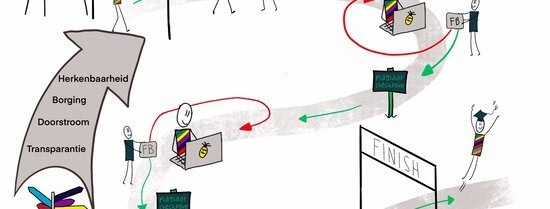Introduction
Key terms: analysis of literature , bibliometrics, bibliometric visualisation, science mapping, VOSviewer software tool, introductory course, relevant for students in any PhD phase.
ECTS: 1.5
Number of sessions: 2
Hours per session: 4
It is essential for researchers to have an up-to-date understanding of the literature in their research field. However, keeping up with all relevant literature and obtaining a good overview of a research field can be difficult and time consuming.
Bibliometric visualisations serve as an effective tool for addressing and overcoming these challenges. Such visualisations provide intuitive overviews of the literature in a research field, enabling researchers to obtain a better understanding of the structure and development of a field and identify key contributions and influential actors.
VOSviewer (www.vosviewer.com) is one of the software tools that can be used for bibliometric visualisation. In this course, through hands-on exercises, participants will learn how to use this software tool to create visualisations of their own research field using a bibliographic data source of their choice (e.g., Dimensions, Lens, OpenAlex, Scopus, or Web of Science).
In addition to learning how to create bibliometric visualisations, participants will also be trained in interpreting these visualisations and in using them to deepen their understanding of their research field. Finally, the course will demonstrate how to publish and share interactive visualisations using VOSviewer Online, the web-based version of the software tool.
Entry level and relevance
This is an introductory course. It is designed for people who have no or limited experience with VOSviewer. No prior knowledge or research experience is required.
The course is useful for researchers in any phase of their PhD trajectory, from any research discipline.
Relations with other courses
This course may be taken either before or after the EGSH courses Doing the systematic literature review and Searching and managing your literature. The latter two courses address related or broader topics pertaining to systematic literature reviewing and literature search strategies respectively, and include only a brief introduction to VOSviewer.
Key Facts & Figures
- Type
- Course
- Instruction language
- English
- Mode of instruction
- Online
Start dates for: Visual exploration of scientific literature with VOSviewer
Edition 1
Session 1: December 9 (Tuesday) 2025 | 13.00-17.00 hrs | Online (Teams)
Session 2: December 11 (Thursday) 2025 | 13.00-17.00 hrs | Online (Teams)
What will you achieve?
- After this course, you will know how to work with bibliographic data sources, such as Dimensions, Lens and OpenAlex.
- After this course, you will know how you can create different types of bibliometric visualisations with VOSviewer, such as those based on co-authorship, co-citation, bibliographic coupling, and keyword co-occurrence.
- After this course, you will understand how you can use these visualisations for exploring scientific literature.
- After this course, you will be able to evaluate the strengths and limitations of bibliometric visualisations.
- After this course, you will know how to export visualisations for use in presentations, reports, or academic publications.
- After this course, you will know how to share interactive versions of visualisations using VOSviewer Online.
Sessions and preparations
Session 1: Bibliometric visualisation, data collection, and VOSviewer
• Introduction to bibliometric visualisation and to the VOSviewer software tool
• Bibliographic data sources
• Co-authorship visualisations
Preparations: participants will need to download the latest version of VOSviewer and test whether it runs on their computer before session 1 begins.
Session 2: Creating different types of bibliometric visualisations
• Citation-based visualisations
• Term/keyword co-occurrence visualisations
• Overlay visualisations
Example of Vosviewer output


Instructor
 Nees Jan van Eck is a senior researcher and head of data science at the Centre for Science and Technology Studies (CWTS) at Leiden University, where he leads data infrastructure projects and coordinates the Information & Openness focal area. Drawing on extensive technical expertise and deep knowledge of diverse scientometric data sources and tools, Nees Jan focuses on studying and developing infrastructures, algorithms, and tools to support research assessment, science policy, and scholarly communication. Nees Jan is the developer of VOSviewer, a widely used software tool for analysing and visualising bibliometric data, which has been cited in more than 50,000 scientific publications.Email address
Nees Jan van Eck is a senior researcher and head of data science at the Centre for Science and Technology Studies (CWTS) at Leiden University, where he leads data infrastructure projects and coordinates the Information & Openness focal area. Drawing on extensive technical expertise and deep knowledge of diverse scientometric data sources and tools, Nees Jan focuses on studying and developing infrastructures, algorithms, and tools to support research assessment, science policy, and scholarly communication. Nees Jan is the developer of VOSviewer, a widely used software tool for analysing and visualising bibliometric data, which has been cited in more than 50,000 scientific publications.Email address
Contact
- Enrolment-related questions: enrolment@egsh.eur.nl
- Course-related questions: ecknjpvan@cwts.leidenuniv.nl
- Telephone: +31 (0)10 4082607 (Graduate School)
Facts & Figures
- Fee
- free for PhD candidates of the Graduate School
- €300,- for non-members
- consult our enrolment policy for more information
- Tax
- Not applicable
- Offered by
- Erasmus Graduate School of Social Sciences and the Humanities
- Course type
- Course
- Instruction language
- English
- Mode of instruction
- Online
